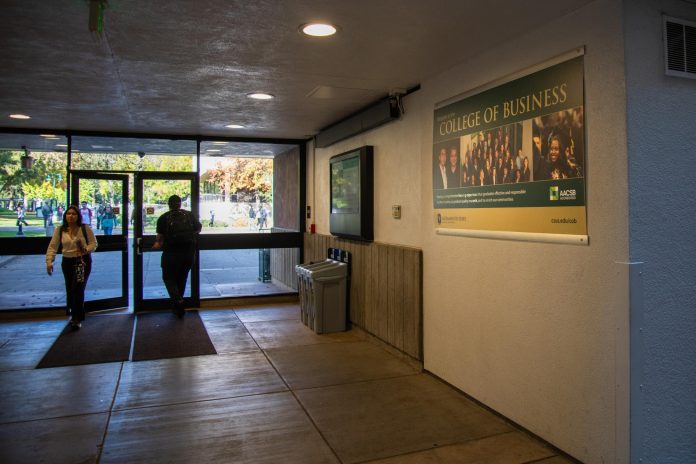Sacramento State will be offering a new concentration on the practical applications of artificial intelligence in spring 2026, with its first students completing a trial run this semester.
Offered through the College of Business, one of Sac State’s most popular and impacted programs, the new Artificial Intelligence concentration is one of the first in the entire CSU system.
Joseph Taylor, the department chair for the Management, Information Systems and Business Analytics Department, said this new concentration will provide students with hands-on skills to develop and implement AI solutions in organizations.
“From vibe coding to change management, our students will be prepared to implement tangible solutions through AI tools,” Taylor said. “The program was designed based on professional experience with emerging AI tools, as well as insights from leading technology professionals in our region.”
Taylor said this program is an AI management concentration of the Bachelors of Science in Business Administration. Taylor said the university will also be launching AI management training for working professionals.
Currently, the College of Business offers 10 concentrations, with more than 50 students already enrolled in two courses offered this semester: Responsible Use of AI and Cloud and AI Infrastructure.
Taylor said the focus is on developing workforce-ready skills that address regional employment needs. While some are cautious about fully integrating artificial intelligence, Sacramento is already implementing AI tools at the city and county level.
According to a report by the Brookings Institution, jobs that require skills with artificial intelligence have increased dramatically since 2010. The report suggests artificial intelligence is more likely to disrupt tasks in high-skill professions by automating routine tasks and augmenting work, claiming it allows workers to focus on higher-value tasks that would require human creativity or critical thinking.
Another 2024 report found that generative artificial intelligence is projected to automate 71% of tasks in office and administrative support occupations, 44% of tasks in business and financial operations occupations, 46% of tasks in sales and related occupations, 49% of tasks in legal occupations and 45% of tasks in computer and mathematical occupations.
“While there is a lot of interesting work being done on designing AI computer chips or building large-language models like ChatGPT, this program will focus on how to customize and implement AI tools to solve real-world problems,” Taylor said.
Gov. Gavin Newsom recently signed Senate Bill 53, the Transparency in Frontier Artificial Intelligence Act, which imposes safety requirements on large companies developing powerful AI models. It requires those large companies to publicly disclose their AI development and any risks associated.
Newsom also recently signed SB 942, the California AI Transparency Act, that requires any company that provides a generative AI system to disclose if an advertisement contains AI-generated pictures, videos and sounds. SB 942 also requires companies to provide a free, publicly accessible tool that allows any person to verify if content was created or altered by their specific AI.
SB 93 will go into effect Jan. 1, 2026, while SB 942 will begin on Aug. 2, 2026.
In 2023, Sac State launched the National Institute on Artificial Intelligence in Society to spearhead the integration of AI into campus life. The institute worked to create AI-specific tools to help students and staff.
RELATED: Sac State’s NIAIS on the future of AI in education
In April 2025, the university discontinued funding for the institute. Sadaf Ashtari, a professor of information systems at Sac State, said the goal of integrating artificial intelligence into the curriculum is to help students develop real-world skills they will use in the workplace.
“We want our students to graduate with hands-on experience using AI tools that are becoming standard in nearly every industry,” Ashtari said. “Adopting new technology at a large university isn’t always easy. The pace of innovation is incredibly fast, new tools are released almost every month while the university approval process takes time.”
Ashtari said she wanted to integrate an AI tool into one of her classes this semester, but the process had to go through several steps of review. She said many of these tools aren’t specifically designed for academia or higher education.
“It really depends on two things: first, how quickly we can adopt the right technologies, and second, how well we train faculty to use them,” Ashtari said. “Once those pieces are in place, I have no doubt that AI will help our students develop the kind of real-world skills employers are looking for.”
Natalie Gonzalez, a senior business administration major, said she is looking forward to the new concentration. Gonzalez said AI is rapidly developing and becoming increasingly present in people’s lives. She said adding this concentration to the College of Business would only benefit its students in preparing them for the world beyond school.
“I believe that there is no point in fighting technological developments,” Gonzalez said. “AI should be used as a tool in school, not just by students but by professors as well.”
Ashtari said the university is currently developing AI-specific courses as part of the new AI management concentration. Ashtari said her own class, Introduction to Python Programming, is not yet available for enrollment but will integrate AI components. Ashtari said this will be one of the foundational courses for the new concentration.
“We’re designing additional core courses like Cloud and AI Infrastructure Management, AI Architecture and Strategy, and Responsible Use of AI,” Ashtari said. “There will also be electives such as AI Implementation, No-Code Development Using AI Agents, and AI and Data Privacy.”
Ashtari said the idea is to give students a mix of technical understanding and strategic insight so that students don’t just know how AI works, but they will also know when and why to use it responsibly in a business context.
“We need to ask: ‘what parts of our jobs are repetitive or frustrating, and how can AI help us automate those tasks so we can focus on the creative, human side of our work?’” Ashtari said. “That’s where AI really shines — it helps us be more productive, efficient and innovative.”
Ashtari said if students can be taught the mindset of how to leverage AI thoughtfully, then they will be in a great position to lead in whatever field they go into.
Kevin Bali, a senior business administration and analytics major, said he is genuinely looking forward to the new artificial intelligence concentration. Bali said the world is rapidly advancing toward AI-driven innovation, and this concentration offers a chance to understand how businesses and organizations can apply AI ethically and effectively.
“I’m particularly excited to learn how it can enhance decision-making, automate processes and create smarter, data-informed strategies,” Bali said. “This opportunity aligns with my passion for connecting business and technology that create meaningful, lasting change in the world.”
Bali said using artificial intelligence in education has sparked some mixed conversations, but he believes that its value depends on how it’s used. He said that, when approached responsibly, AI can be a powerful tool that strengthens learning rather than replaces it.
“Many of my business and criminal justice courses already include discussions and projects involving AI,” Bali said. “It’s not about relying on it — it’s about using it to deepen learning, enhance curiosity and make studying more efficient and engaging.”
Bali said his passion lies in digital forensics and law enforcement, where AI is increasingly transforming investigations, cybersecurity and data analysis.
“This concentration will help me build the foundation to use AI responsibly and make a meaningful impact in creating a future where technology, business and justice work hand in hand,” Bali said.
Gonzalez said there is a blurred line between using artificial intelligence as a tool and abusing it for personal benefit. Gonzalez said, with AI, she was able to compare an essay she wrote with the assignment rubric. She said, with this AI analysis, she was able to pick up on mistakes she did not catch while proofreading.
“I believe I’ll take these skills and apply [them] to whichever industry I end up in,” Gonzalez said. “It’s more likely than not that a company will be using [artificial intelligence], and it’s important to be informed [about] how to appropriately apply AI to work.”






